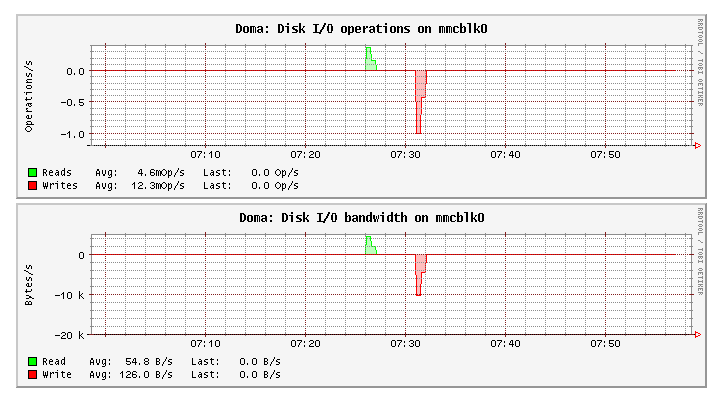I didn’t notice that the rpz was saved in the MMC memory until now, I changed it to the sda.
At least one less write for me.
Thank you.
on my system the “/etc/root.keys” file was updated every hour so i symlinked it to the ssd card. “schnapps diff” does not show any updated files on the system. but i usually have all http frontends like forris and the lucid stopped.
Yes, that’s how it’s been packaged for Turris so far. I personally believe these keys should instead be packaged as static and updated as normal package data, just as we do this for most other distributions. So far I haven’t found time to look into doing that. (So far the keys have only rotated once during whole DNSSEC history!)
The file is continuously be modified, but the content is the save.
I kept checking the modify time using “ls -l”, when it get modified, I can see writes in the MMC.
Since the key doesn’t change, why is the file modified?
The implementer simply didn’t optimize for this case  A tiny write once an hour is nothing normally, especially compared to the cache.
A tiny write once an hour is nothing normally, especially compared to the cache.
I think this is the file:
Should we open a ticket to remind the implementer to optimize for this case too? 
This is the only process writing regularly to mmc.
Instead of that optimization:
Symlinking the file probably won’t help. To ensure atomicity, the file is moved into the location instead of rewritten in-place.
are you sure? my root.keys on the ssd gets updated and the symlink is still there. maybe the update script fails, i haven’t verified this.
Thats great find. I overlooked this as well. Because resolver config already have rundir directive, I thought that rpz and rundir would be enough.
What about modify path directly in /etc/config/resolver instead symlink?
option keyfile <SSD path>?
I just did this fix, will again turn on disk @collectd to see, how it is.
Edit:
Hmm, something else seems to do still some writes (root.keys change was done 6.10, I leave original keys in /etc just to be sure)
root@Doma:/etc ls -la | grep root.keys
-rw-r--r-- 1 root root 416 Jun 11 05:09 root.keys
root@Doma:/etc ls -la /mnt/SSD/kresd/root.keys
-rw-r--r-- 1 root root 416 Jun 11 06:10 /mnt/SSD/kresd/root.keys
Not sure what it could be.
How did you determine that it’s updated every hour? Normal update is on resolver (re)start and then once a day.
Anyway, the the /etc/root.keys part should be solved soon. You can follow details on https://gitlab.labs.nic.cz/turris/turris-os-packages/issues/609
The file never had a last write time older than 1 hour. Maybe i found it somewhere in the code, but i investigated this long ago. I assume i also tried to modify the roots.key path in the init.d / lucid config. but that didn’t help either. Symlinking was my easy approach to get rid of the writes to the mmc without touching the code itself.
Looking at “function keyset_write(keyset)”.
The function writes a temp file and then it renamed the filer to the “root.key”
Maybe the temp file is still written somewhere.
I updated my Omnia to v5.0.2
Writing is even worse, not sure why kresd restarts constantly and each time is writing the file.
2020-06-21 19:20:38 info kresd[9515]: [ta_update] next refresh for . in 1.08 hours 2020-06-21 19:21:16 info kresd[9961]: [ta_update] refreshing TA for . 2020-06-21 19:21:16 info kresd[9961]: [ta_update] key: 20326 state: Valid 2020-06-21 19:21:16 info kresd[9961]: [ta_update] next refresh for . in 1.08 hours 2020-06-21 19:21:21 info kresd[10329]: [ta_update] refreshing TA for . 2020-06-21 19:21:21 info kresd[10329]: [ta_update] key: 20326 state: Valid 2020-06-21 19:21:21 info kresd[10329]: [ta_update] next refresh for . in 1.08 hours 2020-06-21 19:23:10 info kresd[10996]: [ta_update] refreshing TA for . 2020-06-21 19:23:10 info kresd[10996]: [ta_update] key: 20326 state: Valid 2020-06-21 19:23:10 info kresd[10996]: [ta_update] next refresh for . in 1.08 hours 2020-06-21 19:23:15 info kresd[11352]: [ta_update] refreshing TA for . 2020-06-21 19:23:15 info kresd[11352]: [ta_update] key: 20326 state: Valid 2020-06-21 19:23:15 info kresd[11352]: [ta_update] next refresh for . in 1.08 hours 2020-06-21 19:24:50 info kresd[11967]: [ta_update] refreshing TA for . 2020-06-21 19:24:50 info kresd[11967]: [ta_update] key: 20326 state: Valid 2020-06-21 19:24:50 info kresd[11967]: [ta_update] next refresh for . in 1.08 hours 2020-06-21 19:24:55 info kresd[12335]: [ta_update] refreshing TA for . 2020-06-21 19:24:55 info kresd[12335]: [ta_update] key: 20326 state: Valid 2020-06-21 19:24:55 info kresd[12335]: [ta_update] next refresh for . in 1.08 hours 2020-06-21 19:25:31 info kresd[13342]: [ta_update] refreshing TA for . 2020-06-21 19:25:31 info kresd[13342]: [ta_update] key: 20326 state: Valid 2020-06-21 19:25:31 info kresd[13342]: [ta_update] next refresh for . in 1.08 hours
The solution I linked above hasn’t landed yet. Until then, it’s normal to have one write on each (re)start and then every 24h.
Restarts don’t happen normally, and this is especially frequent. To look into that, I’d probably start by getting more logs (especially just before the crashes) by editing /etc/config/resolver section config resolver 'common' line option verbose '0' to '1'.
EDIT: note to self, followed up on ticket #1102025.
echo 1 > /proc/sys/vm/block_dump
then watch the log, e.g. logread -f | grep mmc.
Turn off the dumping with echo 0 > /proc/sys/vm/block_dump

